Looking for Expert-Level VA Claim Answers?📱Call Us Now! 737-295-2226
One of the more common questions we get at VA Claims Insider is “Are National Guard Veterans?” and whether National Guard and Reservists can get VA benefits.
The answer is YES, and in this guide, we’ll reveal the 8 Best Reservist and National Guard VA Benefits.
- Are National Guard Veterans?
- Why “Veteran Status” Matters for VA Benefits Eligibility
- Important Definitions That Impact Guard and Reserve Status for VA Benefits
- What is Veteran Status for National Guard and Reserve Members?
- What is “Active Service” in the National Guard or Reserve?
- State Active Duty vs. Federal Active Duty
- How to File a VA Claim for Guard or Reserve
- 6 Tips for National Guard and Reservists to Get VA Disability Benefits
- List of the 8 Best VA Benefits for National Guard and Reserve Members
- #1. VA Disability Compensation Benefits
- #2. VA Pension Benefits
- #3. VA Home Loan Benefits for Guard and Reserve
- #4. VA Education Benefits
- #5. VA Healthcare Benefits for National Guard and Reserve Members
- #6. VA Life Insurance Programs
- #7. VA Employment and Job Training Benefits (aka, “Voc Rehab” or Chapter 31 Benefits)
- #8. VA Burial Benefits for Guard and Reserve
- Frequently Asked Questions (FAQs) – National Guard and Reserve Eligibility for VA Benefits
- Do I qualify for VA benefits as a National Guard or Reserve member?
- Are National Guard Veterans?
- Can National Guard Get VA Disability?
- Does 6 years in the National Guard make you a veteran?
- Are Reservists Veterans?
- Are there VA benefits for Reservists?
- What is the difference between Traditional National Guard or Reserve member and as an Active Guard Reserve (AGR) member?
- Do Active Guard Reserve (AGR) members get VA benefits?
- What is Traditional Service in the National Guard or Reserves?
- Do Military Technicians qualify for VA benefits?
- What qualifies as a “Wartime Period” for VA benefits eligibility?
- What are VA Benefits for Veterans vs. VA Benefits for Survivors?
- Where can I go to learn more about VA benefits for National Guard and Reserve Members?
- Are you a National Guard or Reservist who needs help with your VA disability claim? WE GOT YOUR SIX!
- About the Author
Are National Guard Veterans?
YES! Thanks to a 2016 change in federal law, a National Guard member who deployed on federal active duty orders for at least 180 days, and didn’t get a dishonorable discharge or a bad conduct discharge, is now considered a “veteran.”
In addition, the law now grants official “veteran status” to National Guard members who served 20 years or more, even if they were never activated on a federal active duty orders for more than 180 days outside of training.
Furthermore, all National Guard and Reserve members discharged or released under conditions that are not dishonorable (e.g., honorable, general, or other than honorable) are eligible for VA benefits.
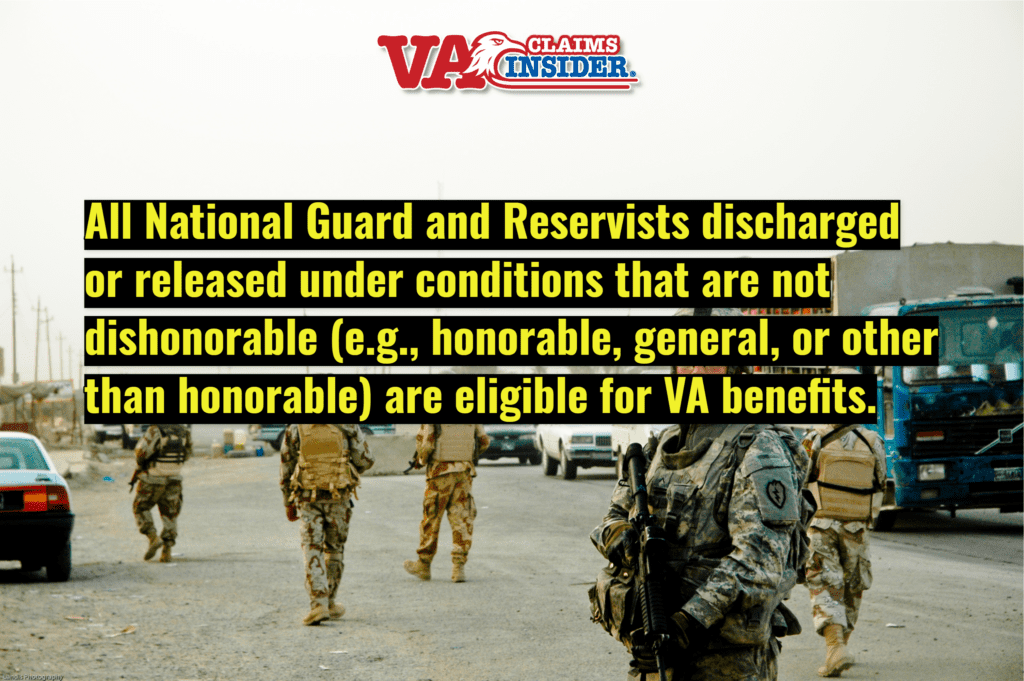
Some of the top VA benefits available to National Guard and Reservists include, VA Disability Compensation, VA Pension, VA Home Loans, VA Education, VA Healthcare, VA Life Insurance, VA Employment and Job Training (aka, “Voc Rehab” or Chapter 31 benefits), and VA Burial/Memorial benefits.
Okay, let’s jump into some important definitions and eligibility factors, and then we’ll explore the various VA benefits available to Guard and Reservists.
Why “Veteran Status” Matters for VA Benefits Eligibility
Eligibility and entitlement for VA benefits largely depends on a “Veteran Status” determination made by the VA, to include length of service, service commitment, and the number of days spent on active duty orders.
Click HERE to review M21-1 – Chapter 6 – Establishing Veteran Status, to review the complete decision matrix used by VA Raters to determine VA benefits eligibility for National Guard and Reserve members.
Important Definitions That Impact Guard and Reserve Status for VA Benefits
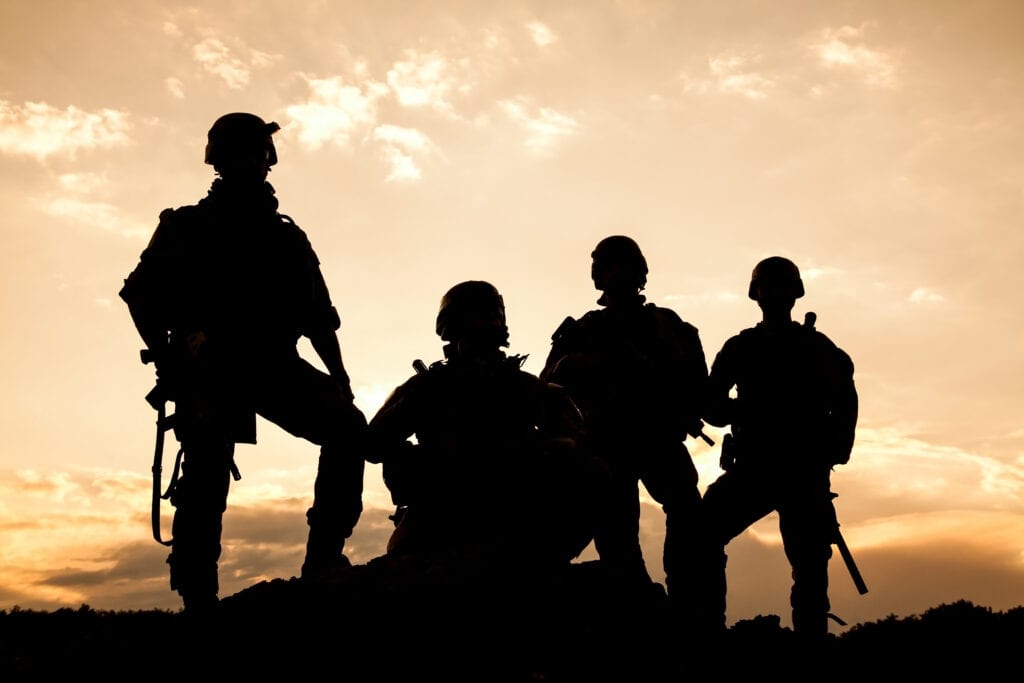
Armed Forces means the United States Army, Navy, Marine Corps, Air Force, and Coast Guard, including their Reserve components.
Reserve component means the Army, Naval, Marine Corps, Air Force, and Coast Guard Reserves and the National and Air National Guard of the United States.
Reserves means members of a Reserve component of one of the Armed Forces.
Active service in the Armed Forces of the United States includes:
- Active duty military service
- Any period of active duty for training (ADT) during which a person is disabled or dies from a disease or injury incurred or aggravated in the line of duty, or
- Any period of inactive duty for training (IADT) during which a person is disabled or dies from an injury incurred or aggravated in the line of duty or from any of the following conditions that occurred during training:
- Acute myocardial infarction (aka, heart attack)
- Cardiac arrest, or
- Cerebrovascular accident (aka, stroke)
According to VAOPGCPREC 8-2001, Sexual Assault (e.g., MST PTSD Claims) constitutes an injury for the purposes of this section involving “active service.”
In addition, time spent proceeding directly to and from active duty for training must be considered as part of the active or inactive duty for training as specified in 38 CFR 3.6(e).
What is Veteran Status for National Guard and Reserve Members?
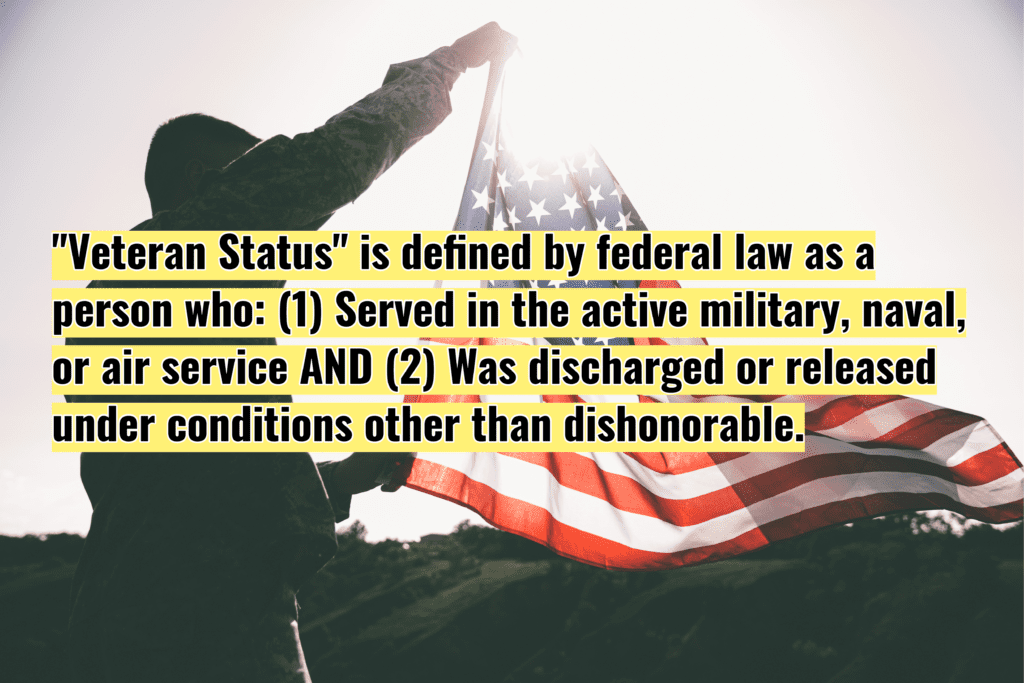
Veteran status is defined by federal law as a person who: (1) Served in the active military, naval, or air service AND (2) Was discharged or released under conditions other than dishonorable.
- For VA disability compensation and Dependency and Indemnity Compensation (DIC) the term “veteran” includes a person who died in active service and whose death was not due to the veteran’s own willful misconduct.
- For VA death pension the term “veteran” includes a person who died in active service under conditions which preclude payment of service-connected death benefits, provided such person had completed at least 2 years honorable military, naval or air service, as certified by the Secretary concerned. (See §§3.3(b)(3)(i) and 3.3(b)(4)(i)).
Qualifying service is any type of service that qualifies or potentially qualifies a claimant for Department of Veterans Affairs (VA) benefits.
Types of qualifying service are listed in 38 CFR 3.6 and 38 CFR 3.7 and include, but are not limited to:
- Active duty military service
- ADT when a claim for service connection (SC) is based on a disability or death resulting from a disease or injury incurred or aggravated in the line of duty, and
- IADT when a claim for SC is based on disability or death resulting from an injury incurred or aggravated in the line of duty or myocardial infarction, cardiac arrest, or a cerebrovascular accident which occurred during such training.
What is “Active Service” in the National Guard or Reserve?
Defining the term “active service” is critically important to determine VA benefits eligibility for National Guard and Reservists.
Why?
Because VA benefits for Guard and Reserve members largely depends on the number of days spent on active duty orders.
Active Service in the National Guard or Reserve includes members in the following two categories:
- Active duty (Title 10): Full-time duty in the Armed Forces, such as unit deployment during war, including travel to and from such duty, except active duty for training, OR
- Full-time National Guard duty (Title 32): Duty performed for which you are entitled to receive pay from the Federal government, such as responding to a national emergency or performing duties as an Active Guard Reserve (AGR) member.
State Active Duty vs. Federal Active Duty
A state or territory’s governor may activate National Guard members for State Active Duty, such as in response to a natural or man-made disaster.
State Active Duty is based on state law, not federal law, and therefore, does NOT qualify as “active service” for VA benefits.
Unlike full-time National Guard duty, National Guard members on State Active Duty orders are paid with state funds as opposed to federal funds (The VA is a federally funded agency).
How to File a VA Claim for Guard or Reserve
Before separating or retiring from the military, active duty service members to include full-time National Guard or Reservists, can apply for VA disability benefits with the Pre-Discharge Claim program.
If you have an illness or injury that you believe was caused or made worse by your active duty service, you can file a VA claim for disability benefits 180 to 90 days BEFORE you leave the military.
This can help help speed up the VA claim process so you can get your benefits sooner.
To use the VA’s Pre-Discharge Claim program, ALL the following must be true:
- You’re a service member on full-time active duty (including a member of the National Guard, Reserves, or Coast Guard), and
- You have a known separation date, and
- Your separation date is in the next 180 to 90 days, and
- You’re available to go to VA exams for 45 days from the date you submitted your claim, and
- You can provide a copy of your service treatment records for your current period of service when you file your claim.
However, at VA Claims Insider, we recommend using the VA’s Fully Developed Claim (FDC) program right on the new VA.gov website along with these useful tips from VA Raters to increase your VA rating.
6 Tips for National Guard and Reservists to Get VA Disability Benefits
The following 6 tips are from a former VA Rater (RVSR) who has extensive experience reviewing and rating VA disability claims for National Guard and Reservists.
- Tip #1: Line of Duty Determinations (LODs) for National Guard and Reservists are EXTREMELY important.
- Tip #2. Tinnitus claims are usually the easiest way to start a VA disability claim WITHOUT an LOD.
- Tip #3. Buddy Letters are effective to help prove service connection if it was directly witnessed by the buddy writing the letter for you (can’t be hearsay).
- Tip #4: Get your DD 214 for ANY period of active duty service and submit it to the VA as supporting evidence with your claim.
- Tip #5: ALWAYS make copies of your military personnel and service records as well as your medical records.
- Tip #6: It can be useful to schedule and attend medical appointments corresponding with Drill Weekends.
List of the 8 Best VA Benefits for National Guard and Reserve Members
#1. VA Disability Compensation Benefits

VA Disability Compensation is a monthly tax-free benefit paid to veterans who are at least 10% disabled because of injuries or diseases that were caused or made worse during active duty military service or active duty for training.
The VA will pay monthly benefits to separated or retired National Guard and Reserve members for disabilities from disease or injury incurred or aggravated during active duty service and active duty for training, AND for disabilities from injury incurred or aggravated during inactive duty for training (formerly known as “Battle Assembly”).
However, the VA will not pay disability compensation benefits for diseases and related conditions incurred or aggravated during inactive duty for training except as determined by veteran status and qualifying service.
>> Click HERE to see the NEW 2022 VA Disability Pay Rates.
#2. VA Pension Benefits
VA Pension is a tax-free benefit paid to Veterans with limited income and net worth who served during a wartime period (see complete list of recognized wartime periods in the FAQs section below).
Generally, National Guard and Reserve members must have 90 days or 24 months of active service (depending on when you served) to qualify for VA pension benefits.
#3. VA Home Loan Benefits for Guard and Reserve
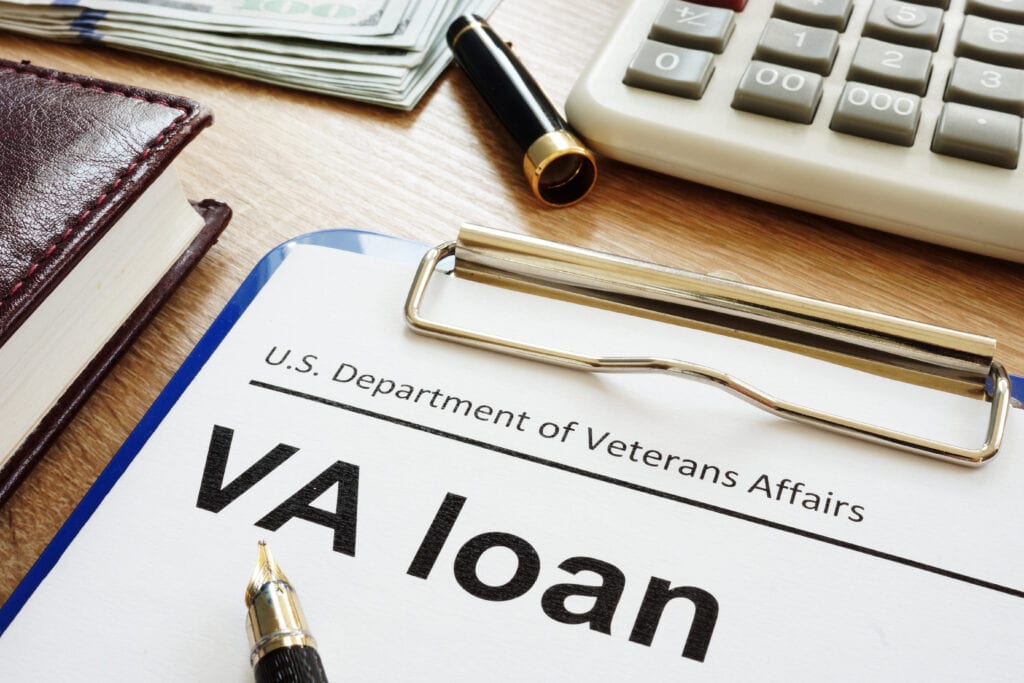
VA Home Loan Benefits, aka “Home Loan Guaranty,” allows National Guard and Reserve members to get home loans with more favorable terms.
Private lenders provide the loan, but VA guarantees a portion of it, allowing lenders to provide benefits such as no down payment or mortgage insurance premiums.
To qualify for a VA home loan as a National Guard or Reserve member, you must meet one of the following conditions:
- Served for 90 days or more on active duty during a wartime period, OR
- Were discharged or released from active duty for a service-connected disability, OR
- Have six years of service in the Selected Reserve or National Guard, AND
- Were discharged honorably, OR
- Were placed on the retired list, OR
- Were transferred to the Standby Reserve or an element of the Ready Reserve other than the Selected Reserve after honorable service, OR
- Continue to serve in the Selected Reserve.
Don’t forget if you have a VA disability rating of 10% or higher, you qualify for the VA Funding Fee Waiver, which could potentially save you thousands of dollars or more on your home.
Make sure to get a copy of your VA COE Form during the VA loan application process.
#4. VA Education Benefits
VA Education Benefits provide valuable education and training options to National Guard and Reserve members, including financial support for undergraduate and graduate degrees, vocational and technical training, licensing and certification tests, apprenticeships, and on-the-job training.
You may be eligible for one or more of the following programs if you meet certain service requirements:
National Guard GI Bill Benefits
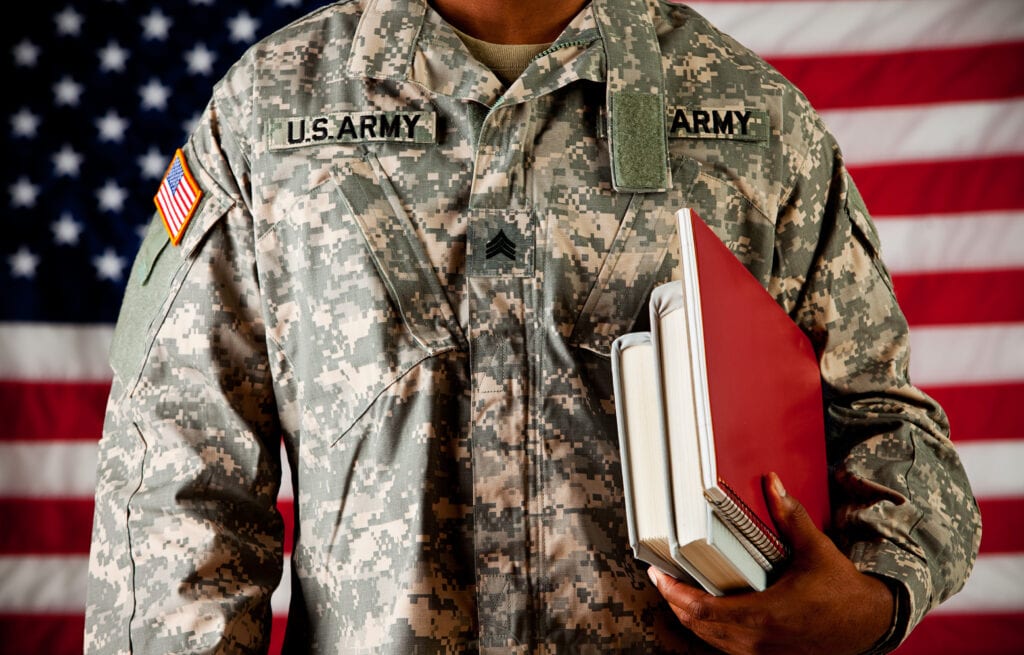
The Post 9/11 GI Bill offers up to 36 months of education benefits to those who are eligible, for programs ranging from flight training to undergraduate or graduate degrees.
According to VA, National Guard or Reserve members must meet the below criteria to be eligible for benefits under the Post 9/11 GI Bill:
- You were honorably discharged from active duty for a service-connected disability after serving at least 30 continuous days after September 10, 2001, OR
- You have at least 90 aggregate days of active service consisting of:
- Active duty (Title 10) supporting named contingency operations, OR
- Full-time National Guard duty (Title 32) for the purpose of organizing, administering, recruiting, instructing, or training, OR
- Full-time National Guard duty (Title 32 under section 502(f)) when authorized by the President or the Secretary of Defense for the purpose of responding to a national emergency declared by the President and supported by Federal funds.
Do GI Bill Benefits Expire?
It depends on when you were discharged from active duty service.
- If your service ended BEFORE January 1, 2013, your Post-9/11 GI Bill (Chapter 33) benefits will expire 15 years after your last separation date from active service. You must use all your benefits by that time or you’ll lose it.
- If your service ended on or AFTER January 1, 2013, your GI bill benefits won’t expire thanks to a new law called the Forever GI Bill, Harry W. Colmery Veterans Educational Assistance Act. Learn more about the Forever GI Bill HERE.
Montgomery GI Bill Selected Reserve (MGIB-SR) Program
The Montgomery GI Bill Selected Reserve (MGIB-SR) Program offers up to 36 months of education and training benefits.
If you’re a member of the Army, Navy, Air Force, Marine Corps or Coast Guard Reserve, Army National Guard, or Air National Guard, you may be eligible for this benefit.
#5. VA Healthcare Benefits for National Guard and Reserve Members

VA healthcare benefits may include all the necessary inpatient hospital care and outpatient services to promote, preserve, or restore your health for eligible National Guard and Reserve Members
Eligibility for VA healthcare requires that you served on active duty by a federal order and completed the full period for which you were called or ordered.
If you served on active duty in a theater of combat operations after November 11, 1998, you are eligible for free VA health care benefits for up to 5 years from the date of discharge or release.
Additional factors determine health care benefit eligibility for non-combat Veterans, or those with combat service prior to November 11, 1998.
Learn more about VA healthcare benefits HERE.
#6. VA Life Insurance Programs
VA Life Insurance programs provide financial security and peace of mind to you and your family, especially considering the risks involved in military service.
Eligible Servicemembers and Veterans pay relatively low monthly premiums for coverage, which vary by insurance program.
You are automatically insured under full-time Servicemembers’ Group Life Insurance (SGLI) as either a:
- Member of the Ready Reserve or National Guard who is scheduled to perform at least 12 periods of inactive training per year, OR
- Servicemember who volunteers for a mobilization category in the Individual Ready Reserve (IRR) Part-time coverage is also available to National Guard and Reserve members who do not meet the inactive training requirement above but do perform duty at specific times.
Part-time coverage is also available to National Guard and Reserve members who do not meet the inactive training requirement above but do perform duty at specific times.
List of the Top VA Life Insurance Programs for National Guard and Reserve Members:
- Veterans’ Group Life Insurance (VGLI) is available to service members who are separating, retiring, or being released from assignment from the Ready Reserve, or a National Guard member who was covered by SGLI, OR to members of the National Guard or Reserve covered by part-time SGLI who incurred or aggravated a disability while performing inactive duty or traveling to/from duty, OR to members of the Individual Ready Reserve or Inactive National Guard.
- Family Servicemembers’ Group Life Insurance (FSGLI) is available to the spouses and dependent children of members of the Ready Reserve or National Guard of a uniformed service covered by full-time SGLI. FSGLI is a service members’ benefit and therefore is the only one allowed to be beneficiary. Coverage is terminated on separate from service, divorce, death of the service member or if the service member elects to cancel the coverage.
- SGLI Traumatic Injury Protection (TSGLI) helps severely injured National Guard and Reserve members and their families with the financial burdens associated with recovery by providing a one-time payment to Servicemembers or Veterans who incur traumatic injuries (on or off duty) and suffer losses that qualify for payment under TSGLI.
- Service-Disabled Veterans’ Insurance (S-DVI) provides life insurance coverage to National Guard or Reserve members or Veterans who incurred a service-connected disability while in an active duty status. Applications must be submitted within two years from the date of notification of approval for a new service-connected disability by the VA. This is only for those Veterans discharged on or after April 25, 1951.
- Veterans Mortgage Life Insurance (VMLI) provides mortgage life insurance to severely disabled National Guard or Reserve members or veterans who incurred a service-connected disability while in an active duty status and received a Specially Adapted Housing (SAH) grant from VA.
#7. VA Employment and Job Training Benefits (aka, “Voc Rehab” or Chapter 31 Benefits)
The VA’s “Voc Rehab” Program provides education and training services, including vocational counseling and job-search assistance to National Guard and Reserve members with service-connected disabilities.
If you have a service-connected disability that limits your ability to work or prevents you from working, Veteran Readiness and Employment (formerly called Vocational Rehabilitation and Employment) can help.
You may be eligible for Voc Rehab assistance in preparing for, obtaining, and maintaining suitable employment through VR&E if you are:
- A veteran with a service-connected disability rated at 10% or more, OR
- Hospitalized or receiving outpatient medical care, services or treatment for a service-connected disability pending discharge from active duty, OR
- Severely ill or injured and have been referred to a military Physical Evaluation Board (PEB) or are participating in the DoD/VA Integrated Disability Evaluation System (IDES) process.
You may also qualify for career counseling if you recently separated from the military or are using VA education benefits.
#8. VA Burial Benefits for Guard and Reserve
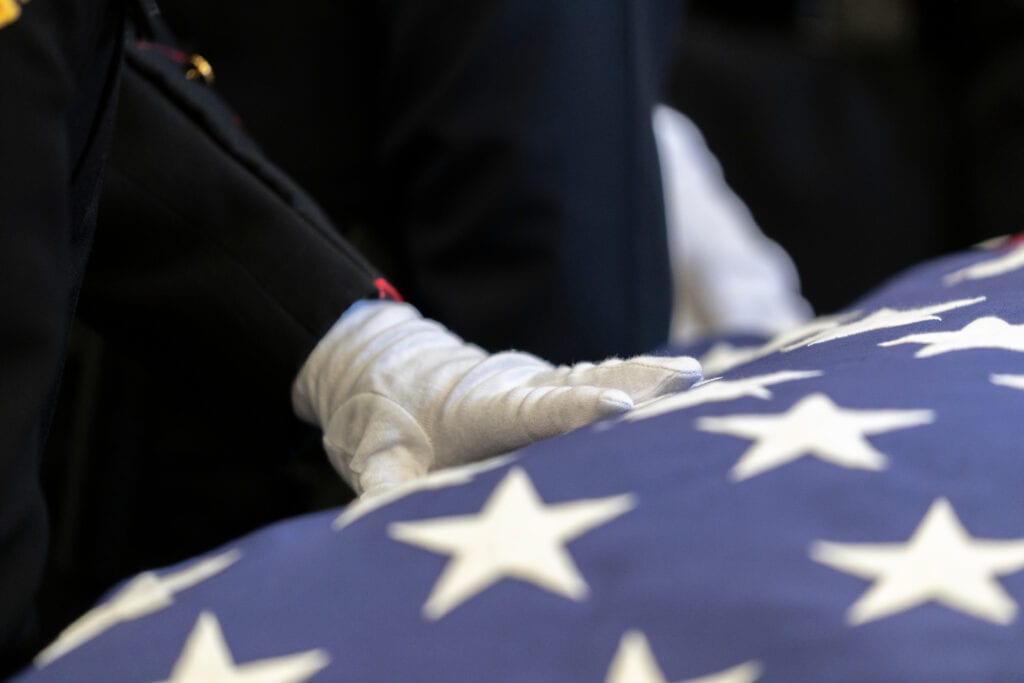
VA Burial Benefits provides burial and memorial services to honor our Nation’s deceased veterans.
Eligibility for VA Burial Benefits requires a National Guard or Reserve Member to have served on active duty, or that your death was due to an injury or disease that developed or was aggravated during active duty, active duty for training, or inactive duty for training.
The National Cemetery Administration offers veterans a gravesite in any of the national cemeteries with available space, opening and closing of the grave, perpetual care, a Government headstone or marker, a burial flag, and a Presidential Memorial Certificate, at no cost to the family of the deceased veteran.
Some veterans may also be eligible for VA Burial Allowances.
Burial benefits available for spouses and dependents buried in a national cemetery include burial with the Veteran, perpetual care, and the spouse or dependents name and date of birth and death will be inscribed on the Veteran’s headstone, at no cost to the family.
Eligible spouses and dependents may be buried, even if they predecease the Veteran.
Here’s a list of 5 VA Burial Benefits for National Guard and Reserve Members:
- VA can furnish an inscribed headstone or marker at any cemetery, or a medallion in lieu of a headstone, or marker to affix to one that is privately purchased.
- VA can provide a burial and/or plot allowance to partially reimburse the burial and funeral costs of a veteran.
- VA can provide a Presidential Memorial Certificate (PMC) for the next of kin and loved ones of a deceased veteran.
- VA can provide an American flag to drape the casket of a veteran.
- A Veteran and his or her dependents can be buried in a VA national cemetery.
Frequently Asked Questions (FAQs) – National Guard and Reserve Eligibility for VA Benefits
Do I qualify for VA benefits as a National Guard or Reserve member?
Yes, generally, all National Guard and Reserve members qualify for some VA benefits.
Different VA benefits may consider different factors to determine eligibility, such as length of service, type of service (such as under Title 10 or Title 32), wartime service, and/or service-related disability.
Are National Guard Veterans?
Yes, National Guard and Reserve Members who are called to active duty and who serve for the entire period for which they were called are considered as “veterans,” thus making them eligible for a host of VA benefits.
However, National Guard and Reservists who are not called to active duty are not considered veterans under the current law.
Can National Guard Get VA Disability?
Yes, National Guard can get VA disability benefits, however, the type and amount depend on “Veteran Status” as well as the total time spent on active duty military orders.
Does 6 years in the National Guard make you a veteran?
Yes, if you spent at least 180 days of that 6 years deployed on federal active duty orders.
A 2016 change to federal law expanded the definition of “veteran” for many National Guard members.
First, the law grants official “veteran status” to National Guard members who served 20 years or more.
Second, even if you didn’t serve for 20 years, you are still a veteran, so long as you were deployed on federal active duty for at least 180 days, and you didn’t get a dishonorable discharge or a bad conduct discharge.
As of 2016, any National Guard member who has reached 20 years of service, even if they were never activated on a federal active duty orders for more than 180 days outside of training, is now considered to be a “veteran.”
Are Reservists Veterans?
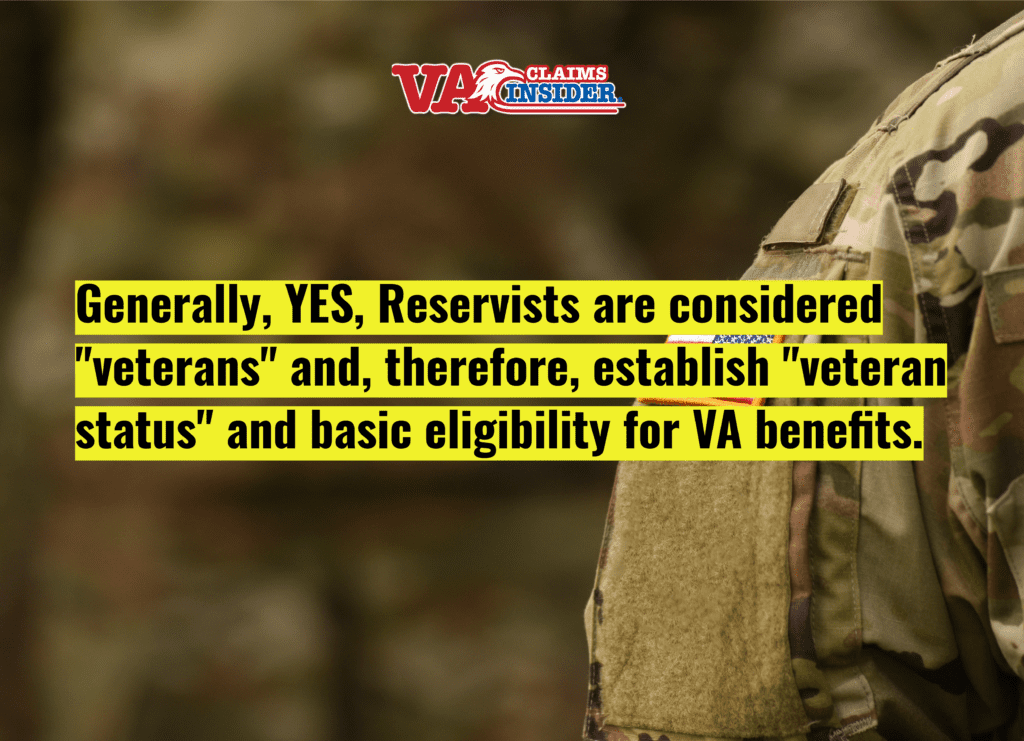
Generally, yes, Reservists are considered “veterans” and, therefore, establish “veteran status” eligibility for certain VA benefits.
Different VA benefits take into account your status as a “veteran,” which affects your basic eligibility, such as length of service, type of service (active duty orders under Title 10 or Title 32), wartime service, and/or service-related disability.
Are there VA benefits for Reservists?
Yes, Reservists qualify for many different VA benefits, however, the type and amount depend on “Veteran Status” as well as the total time spent on active duty military orders.
What is the difference between Traditional National Guard or Reserve member and as an Active Guard Reserve (AGR) member?
Traditional National Guard and Reserve members typically serve one weekend a month and two weeks a year whereas Active Guard Reserve members are full-time members of a Reserve component for which they are entitled to receive pay from the Federal government.
As an AGR member, you establish eligibility for certain VA benefits by your active service under either Title 10 or Title 32.
Do Active Guard Reserve (AGR) members get VA benefits?
Yes, Active Guard Reserve (AGR) are eligible for VA benefits.
The AGR program supports and enhances the mobilization readiness of the Reserve components.
The AGR includes BOTH (1) National Guard (Title 32), and (2) Reserve Members (Title 10) who serve full-time.
Important: National Guard members may establish eligibility for certain VA benefits by performing full-time duty under either Title 32 or Title 10 orders.
What is Traditional Service in the National Guard or Reserves?
Traditional National Guard or Reserve members typically include our “Weekend Warriors,” or those who serve one weekend per month and two weeks per year.
Traditional Guard and Reserve members may become eligible for VA benefits by fulfilling a service commitment.
However, eligibility for VA disability compensation benefits requires that a disability was the result (causation) of an injury or disease incurred or aggravated in the line of duty during active duty or active duty for training.
For inactive duty training, the disability must have resulted from injury, heart attack, or stroke.
Most other VA benefits programs require a specified number of days of active service.
Do Military Technicians qualify for VA benefits?
Military technicians are civilian employees of the Department of the Army or Department of the Air Force who are required to maintain membership in the National Guard or Reserve to retain employment.
Just like traditional National Guard and Reserve members, military technicians are normally in a military status one weekend a month and two weeks a year and are eligible for some VA benefits.
They may establish eligibility for additional VA benefits based on the length of Guard, Reserve, or active service.
What qualifies as a “Wartime Period” for VA benefits eligibility?
As defined by federal law, the VA recognizes the following “wartime periods” for VA benefits eligibility purposes:
- World War I (April 6, 1917 – November 11, 1918)
- World War II (December 7, 1941 – December 31, 1946)
- Korean conflict (June 27, 1950 – January 31, 1955)
- Vietnam era (February 28, 1961 – May 7, 1975, for Veterans who served in the Republic of Vietnam during that period; otherwise, August 5, 1964 – May 7, 1975)
- Gulf War (August 2, 1990 – through a future date to be set by law or Presidential Proclamation). This includes service in the middle east. It is also important to note that Post 9/11 veterans of Operation Iraqi Freedom, Operation Enduring Freedom, and Operation New Dawn are also considered to be Gulf War veterans. The VA defines Gulf War veterans as those “who served on active duty in the Southwest Asia theater of operations any time from August 2, 1990, to present” to include all the following locations:
- Iraq
- Afghanistan
- Kuwait
- Saudi Arabia
- The neutral zone between Iraq and Saudi Arabia
- Bahrain
- Qatar
- Oman
- The United Arab Emirates
- Gulf of Alden
- Gulf of Oman
- Waters of the Arabian Sea, Red Sea, or Persian Gulf
- Airspace above the locations/areas mentioned above.
What are VA Benefits for Veterans vs. VA Benefits for Survivors?
“Live” VA benefits are based on the claimant’s veteran status whereas “Survivors” VA benefits are based on the claimant’s status as the spouse, parent, or child of a deceased veteran.
Where can I go to learn more about VA benefits for National Guard and Reserve Members?
The VA has done a decent job of explaining the various benefits available to National Guard and Reserve members.
Click HERE to learn more about VA benefits for Guard and Reserve troops.
Are you a National Guard or Reservist who needs help with your VA disability claim? WE GOT YOUR SIX!
At VA Claims Insider, we help fellow Veterans, National Guard and Reserve Members celebrate LIFE CHANGE by getting you the VA disability rating and compensation you deserve by law.
And, you’ll get to work with a VA Claim Expert!
- We’re Veteran Owned and Led! FOR Veterans, BY Veterans. We’re the largest community of Veterans Helping Veterans Worldwide™
- 25,000+ disabled veterans served in our Elite Membership program since 2016 with and average VA disability rating increase of >30%
- 4.8/5.0 Google Reviews rating across 2,000+ total reviews
About the Author

Brian Reese
Brian Reese is a world-renowned VA disability benefits expert and the #1 bestselling author of VA Claim Secrets and You Deserve It. Motivated by his own frustration with the VA claim process, Brian founded VA Claims Insider to help disabled veterans secure their VA disability compensation faster, regardless of their past struggles with the VA. Since 2013, he has positively impacted the lives of over 10 million military, veterans, and their families.
A former active-duty Air Force officer, Brian has extensive experience leading diverse teams in challenging international environments, including a combat tour in Afghanistan in 2011 supporting Operation ENDURING FREEDOM.
Brian is a Distinguished Graduate of Management from the United States Air Force Academy and earned his MBA from Oklahoma State University’s Spears School of Business, where he was a National Honor Scholar, ranking in the top 1% of his class.




